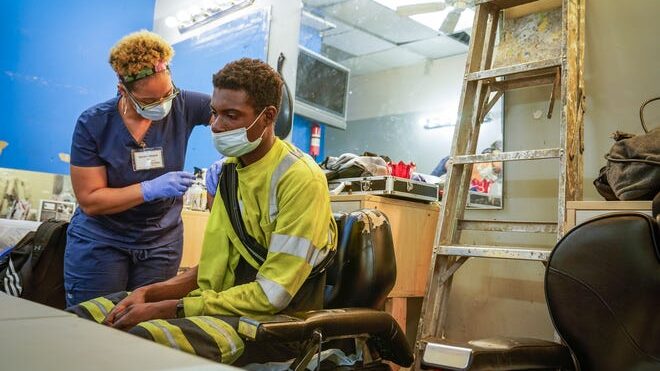In today's rapidly evolving business landscape, one concept stands out as a crucial driver of success: cultural equity. As businesses strive to adapt to a changing world and embrace diversity in all its forms, understanding and prioritizing cultural equity has become...
In Sprint To COVID-19 Vaccine Goal, Biden Administration To Team Up With Black Barbershops
By Nada Hassanein
WASHINGTON – With an eye toward 70% of U.S. adults receiving at least one COVID-19 vaccine dose by July 4, President Joe Biden on Wednesday announced a monthlong effort to encourage more Americans to roll up their sleeves for a shot.
“The more people we get vaccinated, the more success we’re going to have in the fight against this virus,” he said during remarks at the White House, adding that the U.S. could see a dramatically different summer from last year. “A summer of freedom. A summer of joy. A summer of get-togethers and celebrations.”
As part of his June “month of action,” Biden announced “Shots at the Shop,” an initiative bringing together 1,000 Black-owned barbershops and beauty salons across the nation to serve as vaccination locations.
The effort will be modeled after Health Advocates In-Reach and Research (HAIR), said program founder Stephen Thomas, director of the University of Maryland’s Center for Health Equity. Along with the center, the administration will collaborate with the Black Coalition Against COVID and SheaMoisture to support the effort in communities of color, hard hit by disproportionate COVID-19 hospitalizations and deaths.
The announcement comes two weeks after USA TODAY’s reporting on HAIR and its vaccination effort at The Shop Spa in Hyattsville, Maryland. With vaccination rates in communities of color lagging in many states, the network is combating vaccine hesitancy and access obstacles by offering shots right at the shops.
“Whether cause and effect, serendipity, coincidence – I don’t know, but after that (vaccination) event on March 17th and your coverage, I got the … email,” Thomas told USA TODAY Wednesday.
HAIR has been aiming to fight health disparities by transforming the barbershops and beauty salons into health and wellness hubs, leveraging the trust and significance they have in Black communities. The idea, Thomas said, is “you don’t have to be tethered to a hospital” to access good health care.
“This big push to recognize the barbershops and beauty salons in Black and brown communities as assets to be mobilized is just a blessing,” Thomas said. “I could not be more excited and ecstatic.”
For the past decade, Thomas has been collaborating with Black barbers and stylists throughout Maryland’s Prince George’s County, training them to become community health advocates and provide health education to customers to transform the shops into health education hubs.
Stylists promote health surveys and screenings essential to detecting disparate outcomes in Black populations – from colorectal cancer to blood pressure screenings. And at the start of the pandemic, HAIR offered coronavirus tests for barbers, stylists and customers.
Leading up to the pilot COVID-19 vaccination event at HAIR’s anchor salon, the team held Zoom town halls with barbers and stylists during which medical experts addressed concerns about the vaccine. Building on their status as trusted messengers, they then passed on the information to their clients.
Katrina Randolph owns Tré Shadez hair studio in Capitol Heights, Maryland, part of HAIR’s network of 10 Black-owned hair studios.
“I’m super excited,” Randolph said after Biden’s announcement. “I’m really overwhelmed just to see the amazing feedback and see the change in individuals being able to go from ‘No, I don’t want the vaccine,’ to be able to trust what I say and get vaccinated.”
“We’re the closest things to a doctor and nurse, so why not be a part of this network while being behind your chair?” she added.
Thomas is a scholar on the long-term effects of the infamous Tuskegee Syphilis Study, a federally funded experiment on unsuspecting Blacks with syphilis, and Black participation in public health research. He’s also conducted research through the HAIR network’s salons to understand factors behind lower flu immunization rates in Black adults and communication strategies to improve them.
It’s been his dream to replicate and expand the program to other salons.
“This is nothing short of a blessing,” he said. “What this does is finally acknowledge that even in the most destitute neighborhoods, even in the neighborhoods that look blighted … there is still hope.”
See Original Article at USA Today









